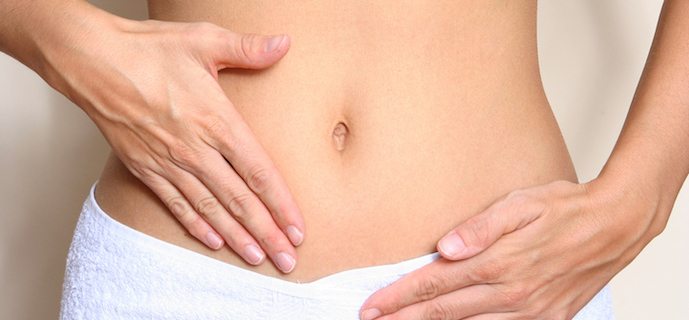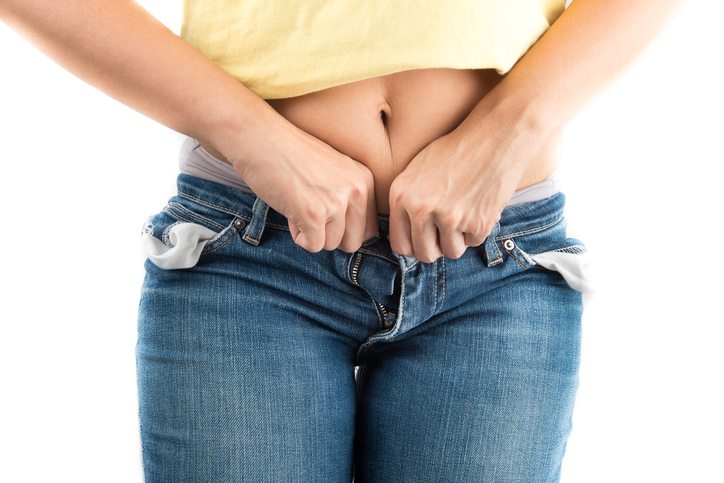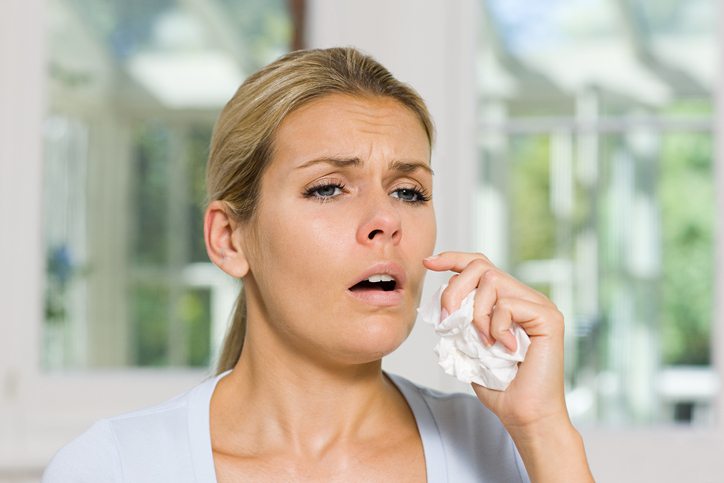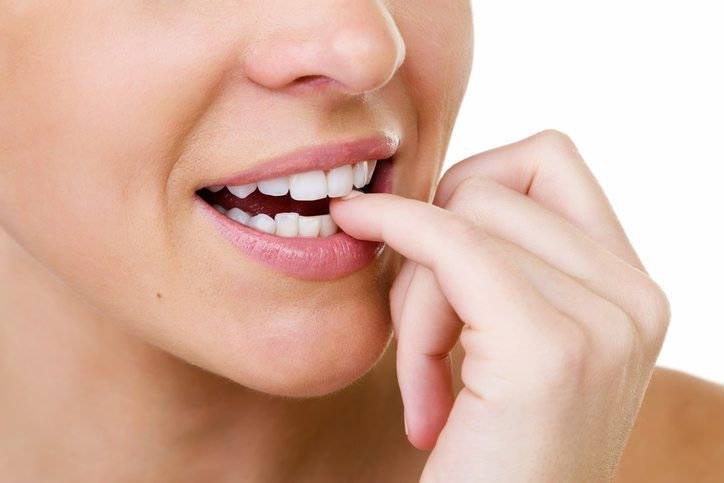From violent sneezing to brittle nails, the signs of gut problems are not always as obvious as bloating, says nutritionist Jeannette Hyde, author of new book The Gut Makeover
-
Heartburn
So common, yet so easy to fix. I know you’ve been told to lie in bed with extra pillows, stop spicy food, or have smaller more frequent meals. You may be taking over-the-counter chalky substances to ease the burning pain or prescribed proton pump inhibitors so your stomach produces less stomach acid. These are all treating symptoms, rather than getting to the root cause, so are not long term solutions.
You may be wolfing your food down without chewing properly
Why is it happening? Because you are stressed. This means you may be wolfing your food down without chewing properly, or you are eating on the run or while dealing with stressful emails and phone calls. This means food goes from the mouth down the chute into your stomach without physically broken down much, and without enough help from the enzymes (chemical scissors) in the saliva in your mouth. This means your stomach acid has much more work to do, and results in heartburn.
The biggest sport competition of the world may be at least another year away but here fifa world cup 2018 live streaming are the complete schedule, groups fixtures and stadiums, so read on
For a whole month chew yourself better. Devote 20 minutes to each meal time (and stick to three main meals a day – not lots of small ones which means your stomach is constantly having to produce more stomach acid). Sit down and chew each mouthful thoroughly, and take time to relax while you eat. Heartburn is often caused by not enough stomach acid, not too much, as is commonly thought. Chewing your food properly will help stimulate more production of stomach acid to help break down your food properly. This is how we are designed to function.
2. Abdominal bloating
This can be caused by not chewing your food properly (as above). Other root causes, and sometimes there are several, not just one, can be you are eating a food which you are intolerant to. Dairy is a classic food which bloats many people – more likely if you are of Asian or African heritage. Milk products contain a sugar called lactose. You need to be producing an enzyme called lactase (those chemical scissors again) in your intestines to break lactose down. Depending on your genes, you may not be producing any or much lactase, and then each time you have a milkshake, some ice cream, or a café latte, you become bloated as gas is produced in protest at a substance being present in the gut which can’t be broken down.
You may not be producing enough lactase in your intestine to break lactose down
Answer: remove milk from your diet and eat a good range of green leafy vegetables, nuts and seeds (if you find can tolerate those ok) for the calcium instead. Try fermented milk kefir as an alternative. Some people find the fermentation process which has broken down much of the lactose already in kefir makes it easier to digest than regular milk.
3. Excessive wind
You may be eating too much sugar and artificial sweeteners which can disrupt the fine balance of gut bacteria in the colon leading to the pathogenic, unfriendly bacteria dominating the scene and getting the upper hand. When this happens, wind can strike! If you are drinking diet cola all day long, knock it on the head. Cut down gradually over a few days and replace with other options. Filtered water with a slice of cucumber, or if it’s winter, try a few slices of fresh ginger with hot water.
4. Constipation
Microbes need to be fed and tended well
The bacteria in our gut, predominantly in the colon (known as the microbiome), weighs on average a kilo and a half. These trillions of bacteria need to be kept happy and in balance. It’s a fine ecosystem. If we travel and are exposed to a different environment they can complain – the food and water we drink are different. These microbes need to be fed and tended well. They need loads of fibre and colour from plants to thrive – so make sure you are eating lots of vegetables with lots of variety. Think soups, salads, pieces of fruit, side dishes of vegetables all chewed thoroughly. Eating airport or service station sandwiches and muffins probably isn’t going to help. Make sure you drink lots of water so the fibre swells up and triggers contractions in the digestive tract to keep everything moving along nicely.
5. Loose stools
This can also happen when the microbiome gets out of balance (as above).
6. Violent sneezing
You may have a leaky gut. This is when the gaps in your intestines become wider than they are supposed to be due to stress, a food intolerance, or too much alcohol, (or all three) and undigested particles of foods start to get into your blood stream and let off an immune reaction leading to violent sneezing in the hour or two after eating.
To keep your gut lining in good shape use real butter and some coconut oil in your cooking regularly for the butyrate in them to nourish your gut lining and keep it healthy.
7. Itchy skin and rashes
As with sneezing. You may have a leaky gut, undigested particles of food are getting into your bloodstream and your immune system reacts. Cutting down your alcohol intake could really help, as could trying to relax and chew your food properly when eating.
8. Weak nails
This can be a sign that you are not absorbing the nutrients from your diet needed for good health. There is a phrase saying ‘we are what we eat’. But we are actually, what we absorb. You can have the best diet in the world, but if you’re unable to break down foods properly and absorb the vitamins, minerals, amino acids from them well, then it’s a bit of a waste of good food really.
We need to be eating enough protein a day which provides the raw material to make enzymes
To break down foods properly we need to chew properly (sorry to get boring about this), have plenty of stomach acid to break food down properly (hence not a good idea to take antacids, which are used to help stomach acid), and plenty of enzymes (chemical scissors) to break your food into little bits before being absorbed. To produce sufficient enzymes, which are made from amino acids from protein, we need to be eating enough protein each day which provides the raw material to make them.
9. Broken bones
You need to produce plenty of stomach acid so that minerals such as calcium and magnesium are being absorbed
You slip in the ice, you break your arm. It was the snow’s fault wasn’t it? Then you suffer a fracture at the gym a few months later. You need to be producing plenty of stomach acid so that the minerals such as calcium and magnesium are being absorbed to build strong bones. Vitamin D from the sun, and K2 a mineral from meat is also needed to take the vitamin D into your bones too. But long term use of antacids, tablets to neutralise stomach acid and relive indigestion symptoms, has been shown to lead to weaker bones and more chance of a breakage. So chew your food well and get your GP to review your antacid prescription. Proton pump inhibitors are not designed for long term use.
10. Feeling anxious and low
When the microbiome is out of balance, it can affect our mood. There is a nerve connecting the gut with the brain and signals pass in both directions between them. Eating a massive range of plants each day – vegetables, herbs, and some fruit – can benefit your brain health too, for the fibres and pigments in them to feed the good bacteria in the gut and create a diverse microbiome. Fermented foods such as kefir, which plant beneficial bacteria in the gut, may also help. There can be many causes of low mood – some more within our control than others. Supporting your microbiome is one factor that might offer some support in the big picture.
MORE: 30 day HIIT challenge from Healthista
MORE: 30 day smoothie challenge with nutritionist Rick Hay

, £6.99, and The Gut Makeover Recipe Book
, £6.29.
Follow on Twitter: @jeannettehyde
Like this article? Sign up to our newsletter to get more articles like this delivered straight to your inbox.

























































